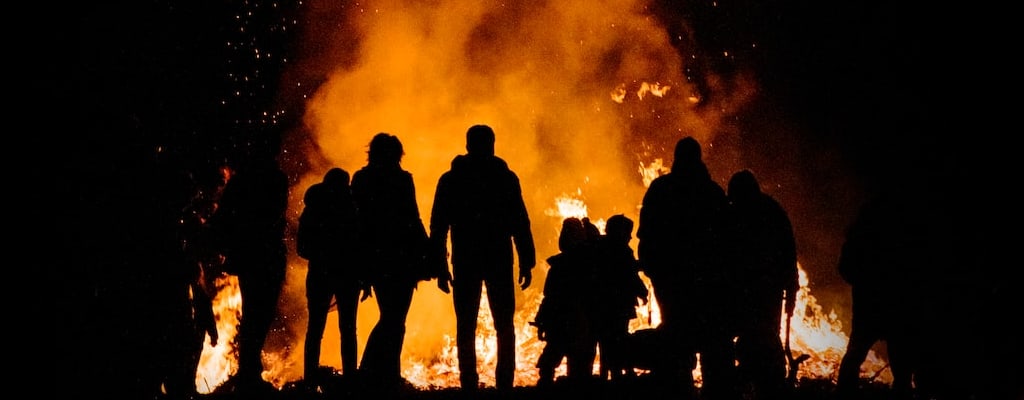blaze away: Idiom Meaning and Origin
What does ‘blaze away’ mean?
Blaze away means to shoot repeatedly or continuously.

Idiom Explorer
The idiom "open fire" means to start shooting or attacking someone with firearms or weapons.
"Empty the clip" is an idiom that means to use up all available resources or weapons, often in a rapid and unrestricted manner, without holding back or saving anything for later.
The idiom "dry up and blow away" means to disappear or become forgotten, often due to lack of attention or relevance. It conveys the idea of something becoming insignificant or irrelevant over time.
In idiomatic use, "draw fire" means to attract criticism or negative attention. This metaphorical phrase originates from the idea of drawing enemy fire in a military context where soldiers put themselves in danger to distract attention from their comrades.
The idiom "bust a cap" means to shoot someone with a gun. It is often used in slang or informal contexts.
The idiom "burn rubber" means to accelerate quickly or drive very fast, often resulting in the tires producing smoke or leaving skid marks on the road.
The idiom "bomb out" means to fail or perform badly in a particular situation or endeavor.
The idiom "blow to kingdom come" means to completely destroy something or someone with a powerful explosion.
The idiom "blow someone's brains out" means to shoot someone in the head with such force that their brains are literally dispersed or damaged. It is an extreme and graphic expression typically used to convey violence or brutality.
The idiom "blow over" means to pass or be forgotten, especially after a period of controversy or conflict.
Fiery Verbal Assault
The idiom "blow away" is closely related to "blaze away" in terms of its figurative meaning. While "blaze away" refers to shooting or firing a weapon energetically and without concern for accuracy, "blow away" is used to describe the act of impressing or astonishing someone greatly. The phrase suggests the idea of overwhelming someone with the force or impact of something, akin to being struck forcefully by a blast of wind.
Similarly, the idiom "open fire" shares a connection with "blaze away" in its literal sense. "Open fire" is used to describe the action of shooting or attacking with firearms. The phrase conveys the idea of initiating an aggressive or intense attack, often in a military or combat context. Like "blaze away," "open fire" emphasizes the rapidity and intensity of the action being described.
Another related idiom is "blaze a trail," which is often used to describe someone who pioneers or establishes a new path or method in a particular field or endeavor. The phrase conveys the idea of leading the way and setting an example for others to follow. It suggests the image of marking a trail by burning or clearing away obstacles, similar to the rapid and energetic burning of a blaze.
The idiom "blast out" is also related to "blaze away" in terms of its figurative meaning. "Blast out" is used to describe the act of producing or emitting sound, typically at a high volume or intensity. The phrase conveys the idea of making a loud and powerful noise, similar to the forceful and energetic action implied by "blaze away."
Lastly, the idiom "blast off" shares a connection with "blaze away" in its imagery and figurative meaning. "Blast off" is used to describe the launch or takeoff of a rocket or spacecraft into outer space. The phrase conveys the idea of an explosive and dynamic departure, as if propelled forcefully into the sky. This sense of powerful and energetic action aligns with the metaphorical usage of "blaze away" to describe someone who speaks or acts passionately and without restraint.
The idiom "blaze away" has several related idioms that share similar themes of energetic action, intensity, and forcefulness. These idioms, such as "blow away," "open fire," "blaze a trail," "blast out," and "blast off," further enrich the metaphorical usage of "blaze away" in the English language. They provide additional shades of meaning and imagery that contribute to the idiom's versatility and expressive power. The interconnectedness of these idioms demonstrates the dynamic nature of language and the ways in which idiomatic expressions evolve and adapt over time.
Example usage
Examples of how the idiom *blaze away* can be used in a sentence:
1. The soldiers blazed away at the enemy, trying to suppress their advance.
2. The kids blazed away on the dance floor, showing off their impressive moves.
3. The guitarist blazed away on his instrument, mesmerizing the audience with his skillful solos.
More "Verbs" idioms



